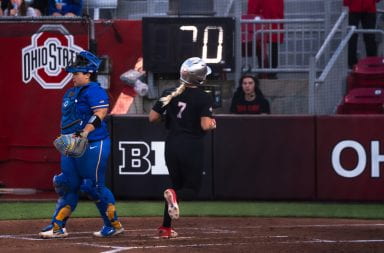
Before choosing a graduate school, students should consider the safety of the campus and off campus areas. Amal Saeed | Assistant Photo Editor
As Julia Dziabis embarked on yet another graduate school interview, she found herself asking tough questions on a commonly overlooked topic — safety.
“Is it safe to run outside? Do you run outside by yourself? What are the surrounding areas like?” Dziabis, a fourth-year in neuroscience, said. “I have to think beyond just the program, beyond just the school because it’s going to be my life for the next couple of years.”
With graduate school quickly approaching, students face many decisions. Before choosing a graduate school, safety should be taken into consideration, and students should be well prepared.
“It’s going to feel much more different to move somewhere brand new and start over,” Dziabis said. “Aspects like safety are a lot more important when thinking about moving, especially moving alone.”
Students can gain the best tips on safety and adjusting to the new environment during the graduate school interview process by talking to other students at their prospective schools, Dziabis said.
“It’s definitely something I take into consideration when I’m visiting and ask the students about because they’re going to have the most realistic view,” Dziabis said.
Dziabias said that the school is looking at more than just someone’s scholarly qualifications during the interview process.
She said the interview also works two ways: the school interviews the students to see if they are a good fit and the student asks the school if the area is a suitable place to live.
The step that might require the most safety consideration is where to live in the new city, and Dziabis recommends keeping in contact with the resources available through the university and asking current students for housing recommendations.
“It provides a good frame of reference of what is a safe and regular way that most people find housing,” Dziabis said. “I want to make sure that wherever I live is at least around other people and in a location where people feel safe.”
Using Columbus as an example, Dziabis said students at Ohio State are well prepared to move to a new place, especially to a city environment.
“This area has a little bit of everything, so you learn that there are some areas that you’d prefer to stay out of, if you’re walking by yourself at night, but you’ve also been well prepared to handle situations like that by being vigilant,” Dziabis said.
Kyla Brathwaite, a first-year graduate student in communications at Ohio State, advised students to ask questions about the community, housing and the city itself and to “branch out” by attending university activities tailored to graduate students, like Welcome Weekend at Ohio State.
“Being a grad student, everyone needs friends, and everyone’s looking to look out for people,” Brathwaite said.
Despite the many tips, fear can still creep in when considering the safety of a potential graduate school.
After applying to schools as far out as California, Dziabis said her biggest fear is being far from her hometown of Chicago in case of an emergency.
“If there were any kinds of emergencies to happen now, I’m only a six-hour drive away,” Dziabis said. “Being across the country and only accessible by plane — and probably an expensive flight — is kind of scary.”
Brathwaite faced similar fears about moving to a new location after graduating from Cornell University in the small town of Ithaca, New York, and coming to the larger city of Columbus.
“I had to realize that I’m not in the middle of nowhere, like it’s a city. There’s other people around,” Brathwaite said.
Dziabis said that despite the fears and safety precautions taking “the leap” to graduate school is definitely worth it.
“You don’t really know how much is out there until you go out,” Dziabis said. “Wherever you choose will help put you on the right path to get to where you want to go in the end.”


